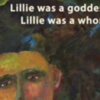
Review
small mammals
By Cati Porter
Mayapple Press
ISBN: 978-1-952781-15-5
Review by Penelope Moffet
Beginning with the first poem, “The Mole,” the main theme of Cati Porter’s new book, small mammals, is clearly set: maternal feeling toward creatures, both human and non-human, particularly but not exclusively the poet’s sons, an ability to empathize so large it encompasses even an insectivore: “Tenderness traps me,/drawn to become his unlikely ally,” the speaker says as she tries to herd the mole to safety. This leads to another of the book’s themes: our inability to truly safeguard ourselves and each other, no matter how hard we try.
In December 2022, I was invited to join a monthly Zoom poetry workshop in which Porter has been a long-time participant. Prior to reading small mammals, I had read only a handful of her poems. I had no idea of the treat in store when I ordered a copy of this collection, Porter’s fourth, published in June by Mayapple Press.
The poems of small mammals are so well-crafted the craft is nearly invisible; while highly polished, they have not been polished to death. The voice is grounded in the everyday world, serious but also often imbued with a humor that sneaks up on you, the way the speaker acknowledges her own absurdity in trying to usher a mole from the hazards of a road into bushes just beyond the curb.
The poems are well-populated with animals and insects: gecko, opossum, praying mantis, ants, moths, beetles, gopher, skunk, burros, rats, cats, coyote, treefrogs, raccoon, and young male humans in various stages of growing up. Porter does not whitewash anything. As teenagers, the sons drink, smoke dope, and get into car accidents and other forms of trouble, while “I sit here barely daring to sip my glass of wine,/phone beside me, volume high, waiting, waiting.” (from “What to Expect: The Teenage Years”).
The heart of the book is a 15-poem sequence called “Lost & Found: A Broken Crown.” This sonnet sequence is heroic in more ways than one. It follows the form (14 sonnets on a single theme, with the last line of each poem becoming the first line of the next, and a 15th sonnet made from the first or last lines of the preceding 14 poems), but Porter modifies the repeating lines to take the words’ meaning to new dimensions in poems about a deeply troubled boy, a friend of one of her sons, who ultimately self-destructs. The poems create a portrait of the young man, the world in which he was raised, his effect on his friends, the effect of others’ bullying him, a number of people’s attempts to save him, grief at his death. She ends Sonnet XII:
So many boys came through my door but
when I said I love you, I meant it, even though
he was not my son, I was not his mother –
Sadness drives many of the poems of small mammals, but also celebration, particularly in the poems that conclude the first section of the book and the collection as a whole. “Praise Song for Sons” is a list poem that begins with “Praise dirty socks left on the bathroom floor!” and ends with a foreshadowing of the grief to come:
Praise the gods that do not take them home
too soon, though one was called
home last Saturday.
Praise that one’s grieving mother.
Praise that she still has one son, and forgive the one
gone, for he knows not what he’s done.
The last poem in the book, “Go On, Stay,” is another list poem that ends:
Praise the candles left lit in the night,
the house that does not burn.
The poems of small mammals are votives illuminating a life strongly intertwined with other lives.
About the Author
 Penelope Moffet is the author of three chapbooks, Cauldron of Hisses (Arroyo Seco Press, 2022), It Isn’t That They Mean to Kill You (Arroyo Seco Press, 2018) and Keeping Still (Dorland Mountain Arts, 1995). Her poems have been published in many journals, including One, ONE ART, Natural Bridge, Gleam, The Rise Up Review, The Sow’s Ear Poetry Review, The Ekphrastic Review, The Journal of Radical Wonder, and Gyroscope. She has been the recipient of artist residencies at Dorland Mountain Arts, The Mesa Refuge, The Helen R. Whiteley Center and Alderworks Alaska. She lives in Southern California.
Penelope Moffet is the author of three chapbooks, Cauldron of Hisses (Arroyo Seco Press, 2022), It Isn’t That They Mean to Kill You (Arroyo Seco Press, 2018) and Keeping Still (Dorland Mountain Arts, 1995). Her poems have been published in many journals, including One, ONE ART, Natural Bridge, Gleam, The Rise Up Review, The Sow’s Ear Poetry Review, The Ekphrastic Review, The Journal of Radical Wonder, and Gyroscope. She has been the recipient of artist residencies at Dorland Mountain Arts, The Mesa Refuge, The Helen R. Whiteley Center and Alderworks Alaska. She lives in Southern California.



